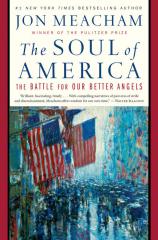The Soul of America: The Battle for Our Better Angels
Review
The Soul of America: The Battle for Our Better Angels
In the swarm of hyperventilating talking heads on cable news, Jon Meacham stands out as a voice of reason. His latest book, THE SOUL OF AMERICA, gives a hint of why that is so. As one would expect from the wise, measured insights that the Pulitzer Prize-winning historian regularly delivers on TV, it’s an elegant survey of some trying moments in our nation’s political history, from the aftermath of the Civil War to the battle for civil rights legislation in the 1960s. Meacham’s message: Yes, friends, things may be bad, but we’ve weathered worse storms than the ones battering us today, and if enough of us keep faith with the values and institutions that have sustained our democracy, we’ll survive this crisis.
The genesis of Meacham's book lay in a request from Time’s then-editor in chief for a commentary on the events in Charlottesville, Virginia, in August 2017. That led him to undertake this larger project, a study of “several different eras in which a politics of fear seemed to triumph, at least temporarily, over hope.” For Meacham, that “tension is a defining one in American history.”
In this collection of discrete case studies, Meacham explores this tension, focusing, as it has once again in our time, around the issues of race and immigration. Whether it was Reconstruction-era America, when the South carried on through other means the conflict that ended in 1865, or the civil rights movement led by Martin Luther King, Jr. and embraced by a Southern president, Lyndon B. Johnson, the 100 years that separated those events show how the country has made consistent, but in no sense permanent, progress in addressing racial inequality. In its current iteration, the flashpoint of that debate is the unequal treatment of African-Americans by law enforcement, a controversy that’s been stoked by the current president’s comments following Charlottesville and by his decision to attack the NFL players' national anthem protest.
"As one would expect from the wise, measured insights that the Pulitzer Prize-winning historian regularly delivers on TV, it’s an elegant survey of some trying moments in our nation’s political history..."
In a similar vein are Meacham’s accounts of earlier clashes over immigration, what he calls an “enduring source of political discontent” in America. The “economic and technological anxiety” that revived the Ku Klux Klan in the 1920s, the anti-Semitism that fueled the original “America First” movement during World War II, and the decision to place thousands of Japanese-Americans in internment camps during that war share their DNA with proposals to ban Muslim immigrants or selectively restrict the flow of newcomers from other countries.
To Meacham’s credit, he doesn’t beat readers over the head with parallels between perilous times in the past and the administration of Donald Trump, although it’s impossible not to feel a small shiver when he describes Wisconsin senator Joseph McCarthy, purveyor of the Communist witch hunt of the 1950s, as a “freelance performer who grasped what many ordinary Americans feared and who had direct access to the media of the day.” McCarthy, Meacham writes, “could distract the public, play the press, and change the subject --- all while keeping himself at center stage.”
In other instances, though, the correspondences are so obvious as to be startling, as when he quotes from a speech by then-Georgia governor Clifford Walker to a Ku Klux Klan gathering in 1924: “I would build a wall of steel, a wall as high as Heaven, against the admission of a single one of those Southern Europeans who never thought the thoughts or spoke the language of democracy in their lives.” The words may be different, but the tune remains the same. Or, as someone once said, “History doesn’t repeat itself, but often it rhymes.”
And what has separated Trump’s performance in office from that of his predecessors in their finest moments, as Meacham calmly explains, is his failure to recognize the truth expressed by Franklin D. Roosevelt during his first campaign in 1932 that the American presidency is “pre-eminently a place of moral leadership.” Our greatest presidents, in the darkest moments of our national history, Meacham argues, have displayed a gift for appealing to what Lincoln called, in his first inaugural address, the “better angels of our nature.” In doing so, as the encouraging examples he draws upon amply prove, they have placed themselves firmly on the side of unity, not division, and inclusiveness, not exclusion.
But for all the credit Meacham gives to presidents of both parties like Lincoln, both Roosevelts, Wilson, Truman and Lyndon Johnson, he’s not willing to airbrush the defects in their portraits, particularly when it comes to their at times regressive personal views on the issue of race. For him, “imperfection is the rule, not the exception.” And so, he is quick to add, “I am writing now not because past American presidents have always risen to the occasion but because the incumbent American president so rarely does.”
To end the book, Meacham departs from his historical account to offer a brief collection of practical prescriptions for readers who want to do more than hurl epithets at the television or compose searing tweets: political engagement, tempering our inclination toward tribalism, respecting facts and reason, striking a balance in criticism of our leaders and, most vital, keeping history in mind. For anyone interested in acting on that last piece of advice, THE SOUL OF AMERICA is an excellent place to start.
Reviewed by Harvey Freedenberg on May 31, 2018
The Soul of America: The Battle for Our Better Angels
- Publication Date: May 8, 2018
- Genres: History, Nonfiction, Politics
- Hardcover: 416 pages
- Publisher: Random House
- ISBN-10: 0399589813
- ISBN-13: 9780399589812




